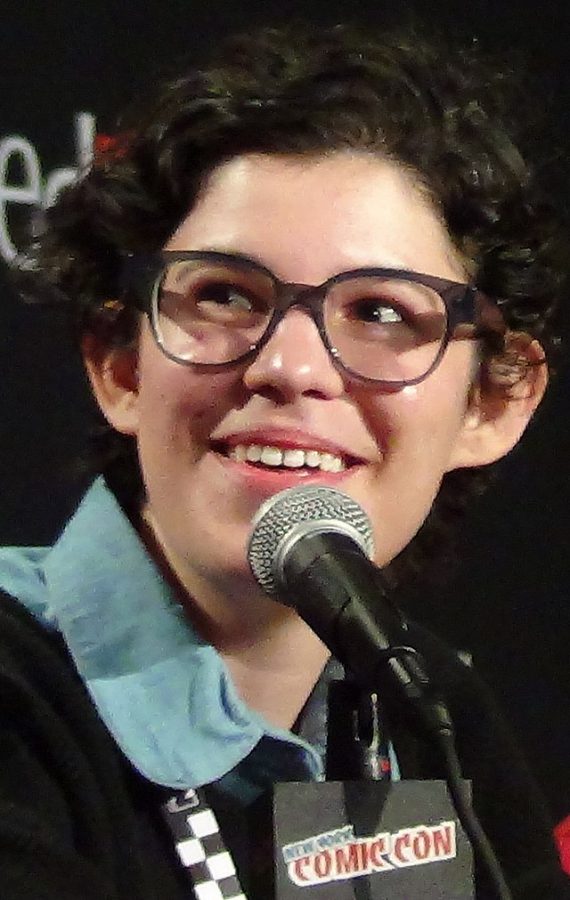TV series ‘Steven Universe’ celebrates diversity
Peter Dzubay | Wikimedia Commons
Rebecca Sugar, the creator of “Steven Universe,” at a New York Comic Con in 2014 (Peter Dzubay | Wikimedia Commons)
March 1, 2022
“Steven Universe” was one of the most iconic cartoons of the 2010s. Although it ended over three years ago, the finale of “Steven Universe” left a sour taste in many fans’ mouths for a variety of reasons.
“Steven Universe,” created by Rebecca Sugar, had a phenomenal start, following the adventures of the titular Steven Universe, a half-human half-alien boy who must go on adventures with his magical guardians, the crystal gems, to save the Earth.
The sets are colorful and every backdrop is touched with beautiful natural lighting. The locations, both magical and ordinary, give off the feeling of immense age but also life and hammers in the core themes of coexistence and harmony.
The characters are just as lively too, with each character having their own sets of quirky traits, whether it’s the stoic but loving Garnet or the eager but insecure Connie, they all are more than just one-dimensional tropes and form complex and sometimes volatile relationships with each other.
The soundtrack was also nothing to scoff at. “Stronger Than You (feat. Estelle)” comes to mind.
Even then, the show’s real treasure was in its themes and representation of complex issues. LGBTQ+ individuals have always struggled with being represented in the media and “Steven Universe” gave them that opportunity. The show delved into issues like abusive relationships, consent and oppression, topics you don’t usually see in cartoons. Because of this, it attracted a lot of kids who felt understood.
Why and how “Steven Universe” became flawed
With all of those things going for it, one may question how it fell from grace. The issues are prevalent in season four of the show. Instead of picking up directly where it left off after the intense season three finale, the show meanders about and focuses on Beach City’s human cast, some of which range from bland to dynamic. While these side characters are nice, it feels like they are just filler episodes, while characters like Lars and Peridot have their development offscreen for the rest of the series.
When the show finally regained its footing, it shifted its focus to uncovering the past of Steven’s enigmatic mother, Rose Quartz, and the reveal of her identity contextualizes her actions. It opens up more questions than answers and the show never devotes enough time to answer these questions in a satisfying way.
In season five some of these issues became even worse for the show’s storyline. The antagonist, White Diamond, had been presented as an ever-present force that served as an existential threat to the Earth as well as the antithesis to the show’s themes of acceptance and diversity. In the final confrontation, she simply changes her mind and she’s defeated.
This failed because not only was she built up to be objectively evil and contributed to the tragic backstories of most of the main cast, but also because it’s simply a bad moral to teach kids. Not everyone deserves to be forgiven and the show’s attempt to shoehorn acceptance of someone that has shown nothing but malice is simply a disservice to the show’s themes and its audience.
“Steven Universe” is ultimately a show that celebrates diversity and understanding but as the show progresses it becomes more interested in its message of forgiveness that it becomes careless about who does and doesn’t deserve it.







